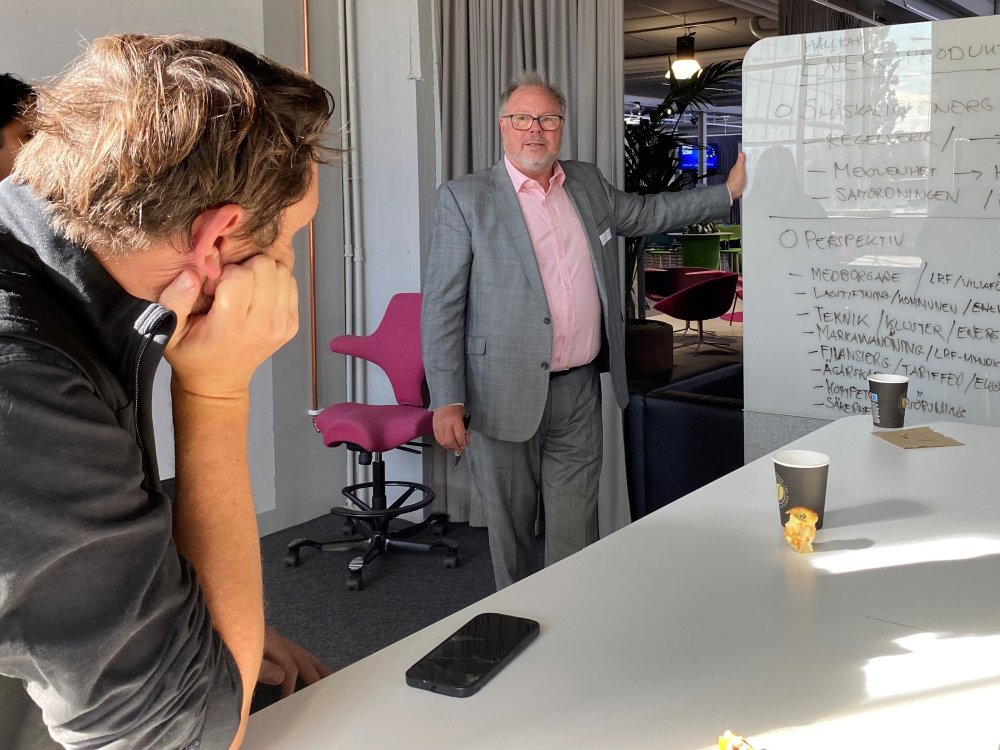PA Education
News
Text: Sandra Zetterman, Policy Area Education
International cooperation is a prerequisite for sustainable regional development. That was the title of a workshop in connection with the West Sweden EU conference in the Swedish city of Skövde at the end of September.
Anders Bergström from PA Education shared the opportunities available within the EU Strategy for the Baltic Sea region.
– Complex societal challenges require more cooperation across national borders. We need to gather resources and expertise and work cross-sectoral, locally, regionally, nationally, and transnationally. We need to cooperate in order to get the needed targeted solutions to our societal challenges of today, says Anders Bergström when he describes the core of the EU's macro-regional strategies.
The goal of macro-regional strategies is to engage stakeholders from different sectors and countries in long-term collaborations. The workshop at the ASSAR Industrial Innovation Arena in Skövde attracted officials from municipalities and regions together with some local and regional politicians from West Sweden. Fifteen people get a one-hour crash course in transnational cooperation before they get to try tackling a current problem together using methods used within the Baltic Sea Strategy.
– We want to integrate the transnational into the work of authorities and organisations' strategic development work. We want to contribute to strengthening and developing organisations' opportunities, competence, and capacity to participate in transnational cooperation, says Anders Bergström.
Where can funding be found?
The Baltic Sea Strategy does not offer funding, but there is no lack of resources for cooperation within the EU's many programs but also from the Swedish Institute. In the new program period, the opportunities to use structural fund programs, for example the European Regional Development Fund for cooperation with partners in other countries, are increasing. More Swedish authorities and organisations also use their own funds to build a long-term collaboration that becomes independent of project funding.
– The Baltic Sea Strategy offers collaboration platforms in several thematic areas. We cannot offer money, but we can offer contacts to relevant actors in Europe and platforms for collaboration. We see ourselves as “collaborative engineers”, says Anders Bergström.
Lisa Bergström from the Swedish Council for Higher Education (UHR in Swedish) and Camilla Wristel from the Swedish Institute also participate in the workshop. They talk about how UHR and the Swedish Institute with their programs can contribute to financing transnational collaborations.
– We have a mission to ensure that Sweden is a bigger part of our Baltic Sea cooperation. We finance exchanges and promote collaborations, says Camilla Wristel, who is responsible for project support within Baltic Sea cooperation at the Swedish Institute.
A chance to try the method
When the time comes to jointly formulate a question, one of the groups lands on the issue of sustainable energy production and small-scale energy solutions. The challenges and questions pop up as the conversation progresses. With their different skills and inputs, the group quickly find a multitude of challenges and issues that need to be dealt with.
Where is there a need for collaboration in this area? What does the regulation look like? The consciousness? Can I as an individual in a community start an initiative like this? How do I do that? How do they do this in other countries?
– In Germany you see their energy solutions, but that is not the case in Sweden. Here, it is more "not in my backyard" when it comes to expansion of wind turbines, for example. How have they worked with that acceptance? asks Sandra Johansson, regional developer for environmental strategic collaboration at Sjuhärad Association of Local Authorities.
Step two for the group is to take inventory of the different perspectives that exist on the issue of small-scale energy solutions and which stakeholders are affected and can be involved under the different perspectives. Questions about legislation, technology, ownership, research, supply of skills and safety come up. Step three is to find a structure to work with the different perspectives. The group divides the long list into three thematic areas and start talking about the issue of funding before it's time to regroup and present the group's work.
– It feels great, I've learned a lot! It's good that it was so concrete, to take an example and test it, says Daniel Thorell who is a forest consultant at the Swedish Forest Agency in the Gothenburg district.




